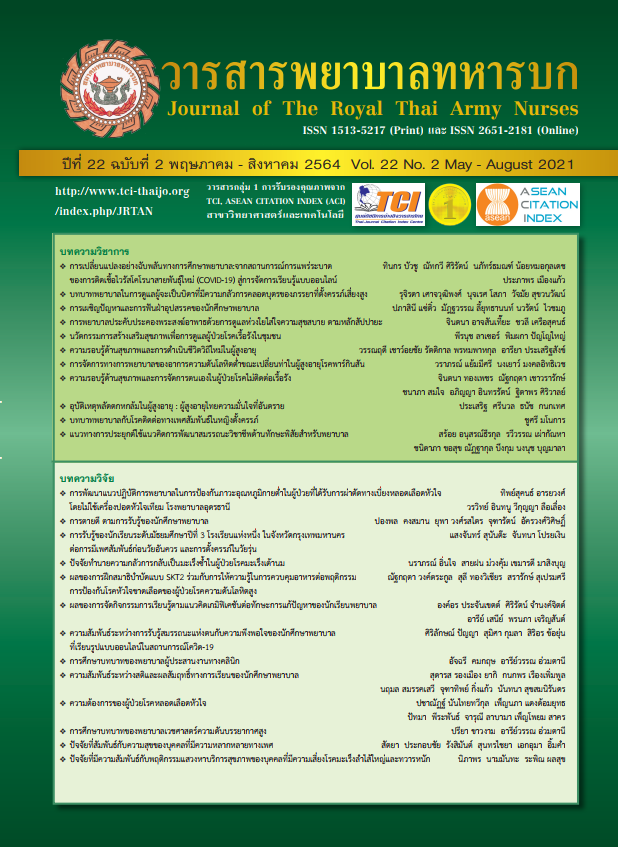A Development of Cognitive Flexibility Program Based on Acceptance and Commitment Therapy in Primary School Students
Keywords:
Cognitive flexibility, Acceptance and commitment therapy, Primary school studentsAbstract
The aims of this research were to develop the Cognitive Flexibility Training Program based on Acceptance and Commitment Therapy in primary school students (CFT-ACT), and to test the effectiveness of the developed CFT-ACT program. The sample consisted of 60 primary school students, with the age between 9-11 years old. The sample was randomized by using random assignment and matching in to groups: an experimental and a control group, each group composed 30 students (Boys = 15, girls = 15). The research instruments were; 1) the CFT-ACT program, which was developed by the researcher based on acceptance and commitment therapy and cognitive flexibility training. And child development concept. It composed of 6 sessions; and 90 minutes in each session; for a total of three weeks, and 2) the Wisconsin card sorting (WCST-64). The experimental group received the CFT-ACT program and the control group joined the regular school’s activities during the same period. The assessments were done in 2 phases: pretest and posttest. The data were analyzed by a t-test.
The results revealed that the experimental group had the mean score of cognitive flexibility in the posttest higher than the pretest with statistically significant at .05 level. Additionally, they had the mean score of cognitive flexibility higher than those in the control group in the posttest with statistically significant at .05 level.
Downloads
References
Panich V. Ways to create learning for students in the 21st century, Journal of Learning Innovations Walailak University. 2015;1(2):3-14. (in Thai)
Scibinetti P, Tocci N, Pesce C. Motor creativity and creative thinking in children: The diverging role of inhibition. Creativity Research Journal. 2011;23(3):262-72.
Diamond A. Executive functions. Annual review of psychology. 2013;64:135-68.
Piaget J, Inhelder B, Fraise P, Piaget J. Intellectual operations and their development. Experimental psychology, its scope and method. 1969:144-205.
Haenjohn J. The effects of acceptance and commitment therapy (ACT) on emotional capital development. Lifelong learning and active citizenship, in P Cunningham & N Fretwell (eds) London: CiCe. 2010:678-86.
Kocovski NL, Fleming JE, Blackie RA, MacKenzie MB, Rose AL. Self-help for social anxiety: Randomized controlled trial comparing a mindfulness and acceptance-based approach with a control group. Behavior therapy. 2019;50(4):696-709.
Hancock KM, Swain J, Hainsworth CJ, Dixon AL, Koo S, Munro K. Acceptance and commitment therapy versus cognitive behavior therapy for children with anxiety: Outcomes of a randomized controlled trial. Journal of Clinical Child & Adolescent Psychology. 2018;47(2): 296-311.
Haenjohn J, Sirithadakunlaphat S, Supwirapakorn W. Development of training on promoting executive functions of the brain in adolescent, Journal of The Royal Thai Army Nurses. 2018; 19(2):220-229. (In Thai)
Kumlerd S, Haenjohn J, Sirithadakunlaphat S. Development of Problem Solving Training Program Based on Acceptance and Commitment Therapy in Adolescents and Young Adults with Amphetamine Addiction. Journal of the Royal Thai Army Nurses. 2019; 20(1):181-187. (in Thai)
Hancock KM, Swain J, Hainsworth CJ, Dixon AL, Koo S, Munro K. Acceptance and commitment therapy versus cognitive behavior therapy for children with anxiety: Outcomes of a randomized controlled trial. Journal of Clinical Child & Adolescent Psychology. 2018;47(2): 296-311.
Haenjohn J. Cognitive Psychology. 2nd ed. Bangkok: Grand point; 2019. (in Thai)
Haenjohn J. A development of mindfulness based working memory training program of undergraduate students. Journal of Education Burapha University. 2019;(13):169-182. (in Thai)
Moore A, Malinowski P. Meditation, mindfulness and cognitive flexibility. Consciousness and cognition. 2009;18(1):176-86.
Sinnott J, Hilton S, Wood M, Douglas D. Relating Flow, Mindfulness, Cognitive Flexibility, and Postformal Thought: Two Studies. Journal of Adult Development. 2018:1-11.
Haenjohn J. A development of mindfulness based working memory training program of undergraduate students. Chonburi: Burapha University; 2019. (in Thai)
Ostergaard T, Lundgren T, Zettle R, Jonassen R, Harmer CJ, Stiles TC, et al. Acceptance and Commitment Therapy preceded by an experimental Attention Bias Modification procedure in recurrent depression: study protocol for a randomized controlled trial. Trials. 2018;19(1):203.
Frogeli E, Djordjevic A, Rudman A, Livheim F, Gustavsson P. A randomized controlled pilot trial of acceptance and commitment training (ACT) for preventing stress-related ill health among future nurses. Anxiety, Stress, & Coping. 2016;29(2):202-18.
Langer AI, Schmidt C, Mayol R, Díaz M, Lecaros J, Krogh E, et al. The effect of a mindfulnessbased intervention in cognitive functions and psychological well-being applied as an early intervention in schizophrenia and high-risk mental state in a Chilean sample: study protocol for a randomized controlled trial. Trials. 2017;18(1)
Downloads
Published
How to Cite
Issue
Section
License
บทความหรือข้อคิดเห็นใดใดที่ปรากฏในวารสารพยาบาลทหารบกเป็นวรรณกรรมของผู้เขียน ซึ่งบรรณาธิการหรือสมาคมพยาบาลทหารบก ไม่จำเป็นต้องเห็นด้วย
บทความที่ได้รับการตีพิมพ์เป็นลิขสิทธิ์ของวารสารพยาบาลทหารบก
The ideas and opinions expressed in the Journal of The Royal Thai Army Nurses are those of the authors and not necessarily those
of the editor or Royal Thai Army Nurses Association.






